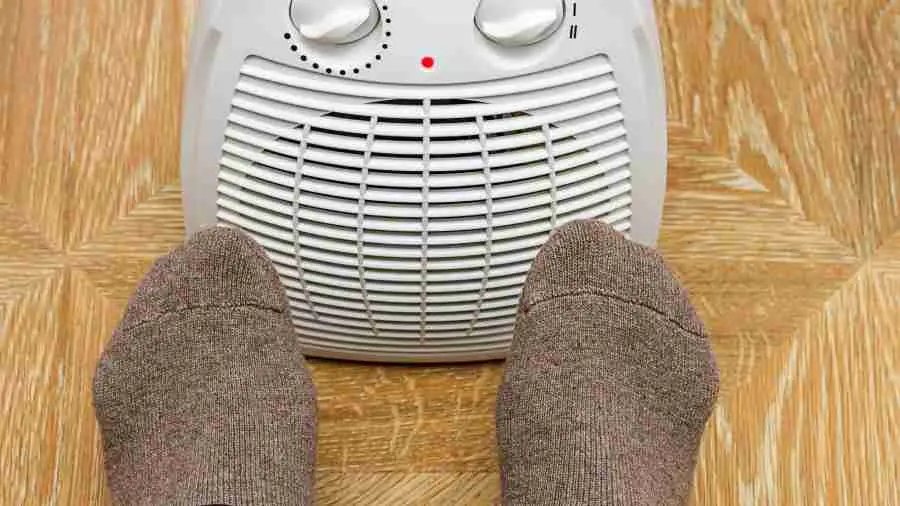If you’re wondering how much electricity your space heater uses, you’ve come to the right place. Here’s the bottom line upfront:
Most electric space heaters use 1500 watts of electricity per hour to keep you warm.
But what does that mean exactly? We’ll guide you through everything you need to know about:
- Space heater electricity usage
- How to determine the cost of electricity for your space heater
- Helpful tips to reduce your energy costs.
It won’t be hard to save power and money this winter, so let’s jump right into it.

Table of Contents
- How Much Electricity Does a Space Heater Use Per Hour?
- What Size Space Heater Do You Need?
- Do Space Heaters Use a Lot of Electricity?
- Why Do Space Heaters Use So Much Electricity?
- How to Heat Your Home More Efficiently and Save Money
- Conclusion
How Much Electricity Does a Space Heater Use Per Hour?
When you’re researching new space heaters, one of the most important specifications you’ll encounter is its power rating, measured in watts.
Most models are rated at 1500 watts (W). In practice, this means they use 1500W of power on average, for every hour they work (on the max heat setting). Sounds great right, but your utility bill likely states your monthly usage in kilowatts. So how do we translate this into the cost of electricity for your space heater? First, we have to convert watts to kilowatts.
Note: always put safety first. Make sure you know how long you can leave your space heater running.
Watts (W) to Kilowatts (kW)
1 kilowatt is the same as 1000W.
That means that your space heater uses 1.5 kilowatts per hour, which equals 1.5 kWh (kilowatt-hour).
Now, that’s only true if you use it on maximum power. Many space heaters also let you use half the power, 750-watts, which reduces your electricity consumption.
How to Determine the Cost of Electricity?

To translate space heater kilowatt-hours into dollars out of your pocket, we need to know how much electricity costs per kilowatt-hour in your area.
According to the U.S. Energy Information Administration (EIA), energy rates depend on many factors to include “the availability of power plants and fuels, local fuel costs, and pricing regulations.” You can find your specific electric rate in the ‘electric charges’ section of your utility bill or use the average rate for your state.
Electric rates can vary by as much as 29¢ per kWh in Hawaii to as little as 9¢ per kWh in Louisiana. That being said, the US average is a bit short of 14¢ per kWh, so we’ll use that number in the following examples. Additionally, electricity needs vary even between similar appliances (i.e. direct vs. indirect water heaters).
Also, realize that your energy company may charge different rates depending on the time of day. Using electric power during the day, when the general consumption is much higher, may cost more. On the other hand, your nighttime energy consumption costs may be lower because not a lot of people are using electric power at that time. These are called on-peak and off-peak hours. Make sure to consider this when calculating how much using your space heater will cost to run.
How Much Electricity Does a 1500-Watt Space Heater Use?
If you use your 1500W heater for an hour, you simply need to multiply 1.5 kWh times the price of electricity in your state (per kWh). I’ll use the 14 cents per kWh US average for this example.
Cost Per Hour
1.5 kWh * 14¢ = 21¢ per hour
Cost Per Day
If you use your electric heater for 10 hours per day that’s:
21¢ per hour * 10 hours = $2.10 per day
Cost Per Month
Here’s how much your space heater will cost per month:
$2.10 per day * 30 days = $63 / Month
How to Calculate the Kilowatt Hours for a Small Heater?
Perhaps you have a heater with a 750W setting or maybe you’re using a small, portable 500W heater. You can expect a reduction in the cost of electricity. We use the same method to calculate the kilowatt-hours and reduction in cost for a smaller heater. The following table provides an overview depicting the cost of electricity for each space heater type.
| Space Heater | Cost Per Hour | Cost Per Day | Cost Per Month |
|---|---|---|---|
| 500W | $.07 | $.70 | $21 |
| 750W | $.11 | $1.05 | $31.5 |
| 1500W | $.21 | $2.10 | $63 |
Note: The values in this table assume the average cost of electricity in the U.S. of $.14 per kWh.
What Size Space Heater Do You Need?

We’ve established that a smaller space heater uses less electricity. But does it necessarily cost less? That depends on the size of the room you’re heating.
The larger the room you are heating, the longer your space heater will need to operate to keep that room warm. This directly translates into higher costs.
To determine the appropriate size, we need to make two assumptions:
- You will use your space heater for supplemental heat
- Your room is insulated
If you’re heating a room with poor insulation, perhaps a basement, you’re working with a different set of assumptions.
As a general rule of thumb, you need approximately 10 watts of heating power for each square foot. This ratio can make a temperature difference of around 10°F, and that’s why you should use a space heater along with your main heating system (whether that’s a furnace, a boiler, or a heat pump).
Measure your room before choosing the right model for you, especially if you need a space heater for a large room. The math is quite simple:
- 75 sq ft and less – A small unit of about 750W will be sufficient
- Up to 100 sq ft – Look for a space heater rated at 1000W
- 150 sq ft and more – You’ll need a more powerful model that uses 1500W.
Do Space Heaters Use a Lot of Electricity?
The short answer is – yes. Unlike ceiling fans (which are famous for having low electric needs), all heaters use a lot of electricity, not only space heaters. Did you know that water heaters typically account for 17% of your electric bill on average (according to the U.S. Department of Energy) – not cheap!
Electric space heaters have a drastically lower heat output compared to their wood or gas-powered counterparts. So, you’d need to use a lot more power to reach the same temperatures.
Electric convection space heaters are better than most of the alternative supplemental heating options for the following reasons:
- Gas heaters emit poisonous carbon monoxide as a byproduct.
- Heat pumps are very inefficient when the outside temperature drops below 25°F.
- Floor heating systems are expensive and difficult to install.
- Wood furnaces are also costly, difficult to clean up, and can be a fire hazard.
So, while electric space heaters cost a bit more to run, their benefits may outweigh the cost:
- Most space heaters on the market are designed with great safety features like tip-over protection and automatic shutdown if it overheats.
- Many of these machines also come with the so-called eco mode, which automatically turns it on or off depending on the surrounding temperature.
- They’re usually very portable and can easily be moved if you need them somewhere else.
Why Do Space Heaters Use So Much Electricity?

Space heaters use a lot of electricity. Why is that?
- The environment in which they operate is not well insulated
- Heating elements lose heat quickly (and must be constantly warmed)
- Space heaters lack efficient power control
Most other electrical appliances use way less electricity every hour.
- A refrigerator only uses about 60 kWh per month, making it very cheap to run.
- A 4K 60-inch LED TV only uses 0.15 kWh.
- A vacuum cleaner needs about 0.75 kWh.
- An incandescent light bulb uses between 0.06 and 0.3 kWh.
Their Environment is not Well Insulated
A space heater is extremely efficient. Meaning that it converts all of the electricity it takes into pure heat. But unlike a refrigerator, which keeps the cool air trapped inside a well-insulated unit, a space heater quickly disperses its hard-earned heat into a cold room.
As a result, space heaters have to work hard, continually turning electricity into heat. When a heater turns off, a room will not efficiently preserve that heat in the same manner that a refrigerator keeps its surrounding air cool. When it comes to cooling drafty spaces sheds and workshops, people often opt for 120v electric garage heaters to keep them warm while working.
Heating Elements Lose Heat Quickly
Electric convection space heaters warm up heating elements made of metal or ceramics and use a fan to spread the heat across the room. Unfortunately, when the heater cycles off, the metal can lose its heat fairly quickly, requiring constant power from the unit.
Oil-filled heaters are a bit more efficient. Though they take longer to warm up, they also retain their heat much better.
Infrared heaters may be the most efficient, however, they heat objects (not the surrounding air) so you must be in the line of sight (and relatively close) of the heater to benefit.
Lack of Control
Finally, you have very little control over how much power goes into a heater. You may be able to set a thermostat, but when the heater is on, it’s running with full power.
Instead, you can control how many heating units (in most cases, wire coils) you want to use. That’s why 1500W units give you two settings: 750W (one heating unit) and 1500W (two heating units used at the same time).
How to Heat Your Home More Efficiently and Save Money

Keeping your home warm in the winter can prove expensive, but there are several steps you can take to reduce that cost.
Pick Ceramics
A convective space heater with ceramic heating units is more energy-efficient compared to one with metal parts. That’s mainly because ceramics warm up faster and retain heat longer. However, you will need to pay a bit more upfront.
Utilize Heater Options
Your heater likely comes with a timer or an ‘eco-mode’. You can set up your space heater to automatically shut off after a couple of hours, making sure you don’t waste more electricity than you need.
The eco-mode is useful as well. This feature uses the device’s thermostat to keep the room at a steady temperature. When the temperature goes down, the heater automatically turns on. Once your room reaches the desired temperature, it shuts down.
Only Heat the Room You Use
If you spend the majority of your time in one room, there’s no need to waste energy by heating the rest of the house. Turn your central heat source down and save electricity by supplementing heat to only the room you’re using.
Insulate and Weatherproof
Many cold homes have insufficient insulation. Drafty windows and doors, crawl spaces, points where plumbing lines pass through the house. Re-caulking seals to ensure openings are airtight will help immensely.
Conclusion
It’s nice to know how much your space heater will cost you every month. Though space heaters consume a fair amount of electricity, they can still be an efficient way to supplement heat to your home. We hope you learned something new today. We take great pride in our research and our writing, so please support The Home Dweller by sharing this on social media. Stay warm!

